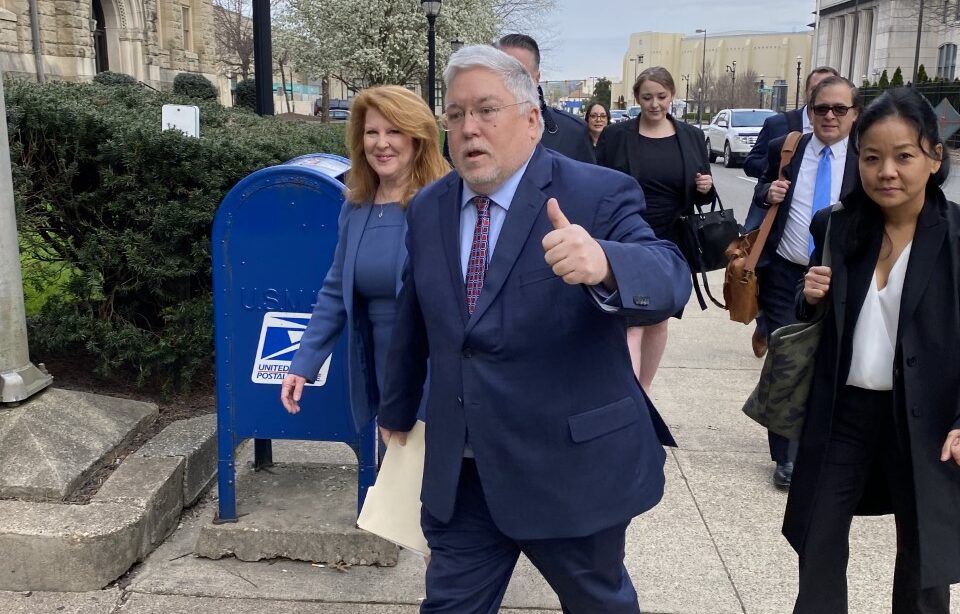New Jersey
Chrissy Buteas: Saving lives around the world by finding cures in New Jersey – New Jersey Globe

OPINION
New Jersey – home to the Sopranos, the Jersey Shore, full-service gas stations and the long-running debate over pork roll versus Taylor ham. Gritty, smart as hell, and loyal to our Jets . . . or Giants . . . or Eagles – that’s Jersey. As a proud New Jersey native, I’ve fiercely defended our great state to those interlopers who criticize us as merely “that place between New York and Philly” (but with better beaches).
New Jersey is so much more than the memes and tropes that fly around the internet. Often overlooked is the fact that for nearly 150 years, New Jersey has been one of the most important places on Earth when it comes to saving lives and improving the quality of life for patients, families and our loved ones all over the world.
Our long, proud and storied (but often unrecognized) history of leading the world stretches from Thomas Edison opening his laboratory in Menlo Park in 1876, to Johnson & Johnson establishing itself in New Brunswick in 1886, to Bell Labs opening its headquarters in Murray Hill in 1967. The advances resulting from such a research-oriented state include the first steam locomotive to actually pull a train, the world’s first submarine, first light bulb, first movie, and even the first brewery in America.
The crown jewel of these transformative contributions – the one that also serves as the beating heart of New Jersey’s workforce and economy is our vibrant and robust life sciences ecosystem. Our state’s medical technology, biotech, diagnostic, pharmaceutical and medical device companies have been at the forefront of cutting-edge medical innovations that have transformed global health, helping patients live longer, with less pain, with more independence while enjoying a greater quality of life. These companies are the envy of our neighbors. Rarely does a week go by without states like Pennsylvania or California, or other countries like Singapore or Ireland, trying to lure the operations of these great companies away from the Garden State.
These and other life sciences companies have driven breathtaking advances in medicine that have delivered new treatments and cures for some of the world’s most dreaded diseases. For the first time in human history, we have cured hepatitis C – the days of liver transplants and life-long treatments are over. We now have a simple vaccine that prevents cervical cancer, something unheard of less than two decades ago. HIV/AIDS has become a chronic, manageable condition instead of the death sentence it once was. A few years ago, we saw the first-ever Ebola vaccine – a life-saving advance for millions of people in Africa and around the world – followed a few years later by a vaccine (and diagnostics and treatments) for COVID-19 as well as the first-ever treatment to delay the onset of Alzheimer’s.
These are merely some of the latest extraordinary breakthroughs in health care these companies work so hard to discover. New Jersey’s life sciences companies are working at breakneck speed to discover new treatments and cures for diabetes, any one of 7,000 rare diseases such as Pompe disease and Non-Hodgkin lymphoma, many types of cancer, and a vaccine against HIV/AIDS. Drug discovery is a highly risky and costly proposition, with only one out of every 5,000 researched compounds making it to market after a 10-to-15-year development process at an average cost of $2.6 billion. However, recent successes and cutting-edge advances in research and technology signify that we’re on the cusp of even more astounding medical progress than was imaginable even a few short years ago.
Recently, I became the new President and Chief Executive Officer of the HealthCare Institute of New Jersey (HINJ – www.hinj.org), a trade association representing the New Jersey companies that are working so hard to research and discover the next generation of treatments and cures. Our mission – and one that I am immensely proud to help champion – is to ensure that New Jersey and our life sciences community continues to do what we’ve done so extraordinarily well for over a century – help patients around the world by finding cures here in New Jersey.

New Jersey
Funeral services held for New Jersey State Police Trooper Marcellus Bethea in Burlington County

EWING, N.J. (CBS) — A somber gathering was held Wednesday to honor a fallen hero. Funeral services were held for Marcellus Bethea, the New Jersey state trooper who died on May 5 while training at the agency’s Ewing facility.
His death remains under investigation.
“To all of you whose hearts are broken in the wake of this tragic loss please know that I and the people of New Jersey are here with you, we grieve with you,” New Jersey Gov. Phil Murphy said.
Murphy reflected on Bethea’s life of duty and integrity and gave examples of heroism on the job.
“There are glaring examples of Marcellus’ heroism in action, like the time he arrived on a scene to aid a motorist and ended up carrying an injured woman from her car just moments before it burst into flames,” Murphy said.
Bethea was an eight-year veteran of the New Jersey State Police. He died while training for the state police’s TEAMS unit, an elite swat-style unit. Fellow troopers and lifelong friends reflected on a life cut far too short.
“There was nothing more important to him than his family, his parents, Kate, his lovely daughter Bella,” New Jersey State Police Trooper Sam Liebman said. “He worked tirelessly to provide for them, I swear, I don’t know anyone that worked more overtime. He was just always there working for them.”
Bethea grew up in Columbus, Mansfield Township, New Jersey. He was a graduate of Northern Burlington Regional High School and Rowan University. His widow spoke through tears as she described his love of being a trooper, something he wanted to be since he was just a child.
“I’ll never forget the way his eyes would light up when he would talk about his passion of being a state trooper, especially being a TEAMS member. Whether it was his love or dedication for his career and commitment to his family, he approached everything with enthusiasm and zest for life,” Kate Bethea said.
Bethea is survived by his wife and 2-year-old daughter. He was 33 years old.
New Jersey
NJ Transit will issue refunds for some tickets bought before June 1 • New Jersey Monitor

NJ Transit will offer refunds on some tickets purchased before June 1 in response to criticism of the agency’s new policy that applies 30-day expiration dates to tickets.
The refund policy, announced Wednesday, will apply to all one-way bus, train, and light rail tickets bought before June 1, and will also apply to 10-trip train tickets purchased then.
The reversal comes after lawmakers and commuters blasted the rail agency for its new expiration date policy, part of a package approved in April that included fare hikes of up to 15% starting July 1 — and a 3% increase each year after. Adding expiration dates to tickets will provide a revenue boost of tens of millions annually, the agency says.
The agency said the overwhelming majority of customers typically do not purchase more than three months of tickets in advance, but the refund option will help people who purchased tickets before the new expiration date policy was announced.
Ticket holders seeking refunds will be able to do so starting Aug. 1 and through Dec. 31.
Previously, people could buy as many transit tickets as they wanted with no worry they’d expire. Under the budget approved by NJ Transit in April, all one-way tickets purchased after July 1 will only be valid for 30 days.
Tickets purchased in June won’t be eligible for a refund, and all one-way tickets purchased before July 1 will expire on July 31, regardless of purchase date.
“Ticket expiration policies are consistent with transit industry best practices across the country,” NJ Transit said in a statement.
The cash-strapped transit agency says that with the new fare hikes, it will close the roughly $100 million budget gap it faced for the upcoming fiscal year. But another shortfall of nearly $800 million is expected in the budget year beginning in July 2025, even considering the revenue from fare hikes.
Senate President Nicholas Scutari (D-Union) last week threatened to introduce legislation to reverse NJ Transit’s expiration date policy if the agency didn’t honor the full value of tickets purchased before the agency announced the change. On Wednesday, Scutari said he welcomes the move by the agency to refund riders.
“NJ Transit has a responsibility to respect the consumer rights of its riders by treating them fairly. If they want to sell tickets with expiration dates, it should be on the tickets or the purchasers should be informed at the time of sale. That is a reasonable expectation for any customer, including riders who rely on the services of a public transit agency,” he said.
How to request a refund
Refunds are expected to take about three to four weeks, and will go much faster for customers who kept their receipts, the agency said in its announcement.
All mobile app tickets will be automatically converted to a full-value credit if unused by August 1.
People who bought online should print out their tickets before June 1. Instructions on how to seek a refund are included on printed tickets.
Customers with paper tickets must visit a customer service office near them with their receipts. If you don’t have receipts, you’ll be asked to provide the last four digits of the credit card used to purchase the tickets.
Customer service offices are located in Hoboken Terminal, Newark Penn Station, Secaucus Junction, Trenton Transit Center, New York Penn Station, and the Port Authority Bus Terminal.
GET THE MORNING HEADLINES DELIVERED TO YOUR INBOX
New Jersey
Why are flags at half-staff in New Jersey? What to know
In a solemn tribute to the sacrifice and service of New Jersey State Police Trooper Marcellus E. Bethea, Gov. Phil Murphy signed an executive order directing all U.S. and New Jersey flags to fly at half-staff on Wednesday.
The gesture comes as the state mourns the loss of Bethea, who died during training on Sunday, May 5.
Why are flags at half-staff?
Murphy, reflecting on Bethea’s character and dedication, remarked, “Trooper Bethea embodied the core values of the New Jersey State Police: Honor, Duty, and Fidelity.” He continued, “We owe a debt of gratitude to our State Police troopers that bravely and selflessly serve the people of New Jersey each day.”
Bethea was undergoing training to become a member of the elite Technical Emergency and Mission Specialist Unit at the time of his death. He leaves behind his wife, Katarzyna, and their daughter, Bella.
“Trooper Bethea’s tragic passing serves as a poignant reminder of the sacrifices made by our law enforcement officers in the line of duty,” Murphy stated. “This loss has been keenly felt across the state, and Tammy and I send our deepest condolences to Trooper Bethea’s family, friends, and his fellow troopers.”
Why are flags lowered?
As New Jersey prepares to honor Bethea’s memory, the lowering of flags to half-staff stands as a somber yet poignant tribute to his dedicated service and ultimate sacrifice. It serves as a visible symbol of mourning and respect for the individual being honored.
In maritime tradition, lowering a flag to half-mast signifies distress. This tradition has carried over into other contexts, such as during national emergencies or tragedies, when lowering the flag can symbolize a nation or community in distress or mourning.
The half-staff position
According to the Department of Veterans Affairs, the flag should be briskly run up to the top of the staff before being lowered slowly to the half-staff position.
Although the flag does not have to be exactly in the middle of the staff or flagpole, it should, however, be lowered to at least the width of your flag.
When are flags flown at half-staff?
Flag etiquette dictates that flags should be flown at half-staff for specific periods following the passing of certain dignitaries and officials. Here’s a breakdown of the protocol, according to the U.S. Department of Veteran Affairs:
- President or former president: Flags should fly at half-staff for 30 days at all federal buildings, grounds, and naval vessels in the United States and its territories.
- Vice president, chief justice, speaker of the house: Flags should be lowered for 10 days after their passing.
- Associate justice of the Supreme Court, cabinet member, former vice president, Senate president pro tempore, Senate majority/minority leaders, House majority/minority leaders: Flags should remain at half-staff from the day of death until interment.
- United States senator, representative, territorial delegate, or resident commissioner from Puerto Rico: Flags should fly at half-staff in the Washington, D.C., area and in the official’s respective state, congressional district, territory, or commonwealth for one day after the death.
- Governor of a state, territory, or possession: Flags should be lowered from the day of death until interment in the governor’s state, territory, or possession.
- Other officials, former officials, or foreign dignitaries: The president has the authority to order flags to be flown at half-staff to honor their passing. Additionally, the president may order flags at half-staff after other tragic events.
Holidays to fly your flag at half-staff
- Memorial Day (Last Monday in May)
- National Pearl Harbor Remembrance Day (Dec. 7)
- Peace Officers Memorial Day (May 15)
- Patriot Day (Sept. 11)
- First Sunday of Fire Prevention Week (usually first Sunday in October)
-

 Politics1 week ago
Politics1 week agoHouse Dems seeking re-election seemingly reverse course, call on Biden to 'bring order to the southern border'
-

 World1 week ago
World1 week agoStand-in Jose Raul Mulino wins Panama presidential race
-

 News1 week ago
News1 week agoCompass Direct LLC’s 2024 Registration in North Carolina
-
News1 week ago
UCLA to resume in-person classes after Gaza protest crackdown
-

 World1 week ago
World1 week agoTech compliance reports, Newsletter
-

 News1 week ago
News1 week agoColumbia University cancels its main commencement ceremony after weeks of turmoil
-

 News1 week ago
News1 week agoMan, 75, confesses to killing wife in hospital because he couldn’t afford her care, court documents say
-

 World1 week ago
World1 week agoPentagon chief confirms US pause on weapons shipment to Israel

















